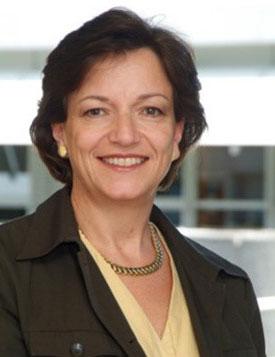You are here
EIB helping Jordan meet water challenges
By Mohammad Ghazal - Dec 27,2017 - Last updated at Dec 27,2017

Flavia Palanza
AMMAN — Work is under way on a technical assistance scheme supported by the European Investment Bank (EIB) to increase the effectiveness, quality and sustainability of a project to enhance the Deir Alla and Al Karameh water supply and sanitation, according to Flavia Palanza, director of neighbouring countries at the EIB.
The EIB has recently signed a cooperation agreement with the Ministry of Planning and International Cooperation to provide a grant of up to 500, 000 euros for the provision of advisory and technical assistance to the project. The assistance aims at increasing the effectiveness, quality and sustainability of the project and enhancing its future developmental impact. The grant will be used to prepare the full technical, environmental, financial and economic study assessing feasibility of the project, she said in a recent e-mail interview with The Jordan Times.
The technical assistance started in October 2017 and is expected to end in mid-2018. The outcome of the EIB support will be a feasibility study with option identification and preliminary design for an upgrade of the water supply system as well as for a wastewater collection and treatment system. Depending on the outcome of the study, the following step will be discussing with the Jordanian government scenarios for financing the project, she added.
The population of Deir Alla and Al Karameh districts is currently around 85,000, including more than 6,000 refugees, and is expected to increase to 88,000 by 2035.
In these districts, water is supplied by a water purification plant using groundwater in Deir Alla. In Deir Alla, the existing water supply system was constructed in 1971 and is relatively old and in bad condition. Furthermore, there is no piped sewerage system, with sewage being collected in leaky cesspits and septic tanks, Palanza noted.
The technical assistance will prepare a technical and economic feasibility study for the upgrading of the water supply system and for the provision of a wastewater collection and treatment system to serve the population’s needs up to the year 2045, Palanza added.
"In doing so, it will explore possibilities to improve pressure management in the water supply system to reduce pipe leakages and minimise energy consumption. The feasibility study will also identify the best solution for a wastewater collection and treatment system in these districts," she said.
It will introduce an analysis on the demand and possibilities of reusing treated effluent and sludge, and it will consider climate resilience aspects in the project preparations. It will also assess the environmental and social impact of the project.
The project will reduce ground water pollution in the Jordan valley, optimise the energy consumption for water supply, wastewater collection and treatment and improve the water supply security, and thus enhance the economic situation for agriculture and tourism. Ultimately, the project will improve the health and environmental situation of the people living in the area, Palanza said.
The project is supported by the Mediterranean Hot Spots Investment Programme (MeHSIP), funded by the European Union and managed by the EIB. It provides direct technical advice and support to promoters for the preparation of investment projects in the water and environmental sectors of the Southern Mediterranean Countries.
The MeHSIP Steering Committee ensures that all selected projects are in line with the regional plans as well as the EU objectives. The committee brings together key stakeholder institutions including the European Commission, the Union for the Mediterranean, the EIB as well as the United Nations Environmental Programme — Mediterranean Action Plan.
Palanza stressed that the EIB has been a "longstanding partner" of Jordan for more than 40 years.
"Being the leading financier of water projects in the world, with almost 64 billion euros for some 1, 400 projects, we understand the importance of the water sector in the country. Jordan is ranked the fourth driest country in the world. Jordan’s climate is arid and semi-arid with short winters and long dry summers. Being fully aware of the challenges, the EIB has supported and financed several projects to secure clean water supply and management," she said.
Currently, the EIB is also working on the Wadi Al Arab Water System II project. In line with Jordan’s National Water Strategy, Wadi Al Arab Water System II will improve potable water for the growing population in the Northern Governorates of Irbid, Ajloun, Jerash and Mafraq.
Demand for potable water in this area has significantly increased with the large number of Syrian refugees in the area. The EIB provided $54 million for the project which is financed in partnership with the Agence Française de Développement (AFD) and the European Union Neighbourhood Investment Facility , she said.
The project will support treating and conveying 30 million cubic metres a year of fresh water from the King Abdullah Canal (KAC) — in the Northern Jordan Valley — to the Zabda Reservoir which serves the Northern Governorate of Irbid — the second largest by population of Jordan’s 12 governorates located 80 km north of Amman, Palanza noted.
The EIB finance is used to build a raw water intake from the KAC, a new water treatment plant, pumping stations, and a 25.6 km transmission pipeline to convey the treated water from the water treatment plant to the Zabda Reservoir.
Related Articles
AMMAN — The Government of Jordan and the European Investment Bank (EIB) have signed a grant agreement of 16.3 million euros to support the i
AMMAN — The Water Ministry has started pumping 10 million cubic metres (mcm) of water to improve supply to the northern areas, which suffer
AMMAN — The European Investment Bank (EIB) signed a framework loan of 260 million euros with the government of Jordan to support priority wa














